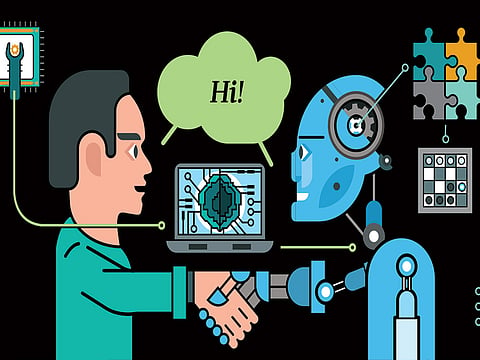Aiming for pole position in a post-industrial world
The UAE’s emphasis on transitioning into an AI-driven world is part of that

Back in the 1970s when I was a university student, our industrial economics professor told us there would be profound changes in the world during the coming years. He said these changes would result in a “post-industrial society” and artificial intelligence would dominate all aspects of life in the next century. The professor’s prediction from more than 40 years ago has proved to be right.
It is a fact that the post-industrial society’s life will be quite different from what humans experienced through over the centuries. At a time when life becomes much easier due to the easy availability of many technologies, there will be increased means of production, the burden on workers will be reduced, and basic living needs can be easily provided for. And technologies that will develop educational skills and eliminate diseases, including incurable ones, will be used.
The UAE economy has become one of the most diversified oil economies thanks to the efforts made to develop an infrastructure, which has provided the necessary source for the development of non-oil sectors
The post-industrial society will also enjoy high-speed transportation and communication. However, many other challenges will emerge by then and need to be dealt with through practical solutions.
According to some forecasts, around 900 million jobs would be lost by 2030 due to artificial intelligence, despite the fact that new jobs would simultaneously be introduced. But they will be fewer than before and would entail high skills that may not be easy to obtain for all.
The important aspect of such an upcoming global trend is that it provides, for the first time, semi-equal opportunities for all countries, the developing and emerging ones alike. It will allow them to develop capabilities through creativity and innovation.
It goes without saying that no society would ever exist without creative people who have to be provided with appropriate resources necessary to nurture their talents and which can help them develop sustainable products and resources, currently a real challenge for the future of all people.
This focus is clear on the part of the UAE’s decision-makers through its support of the talented and creative, and providing them with a conducive environment. And it is clear in the decision to set up a Ministry for Artificial Intelligence. The is one of the first such in the world, and was followed by the establishment of dedicated institutions in many other countries.
Therefore, the UAE approach represents a pioneering initiative that will grant it a leading position on the AI-based digital economy map. It is not common to see an emerging economy try to adopt such an advanced approach.
However, previous experiences such as those of South Korea, Singapore and Hong Kong show that emerging countries can compete with the big ones and even outpace them whenever there is strong leadership and ambitious employees. This is what makes the UAE special, with the attention paid by the leadership and the enthusiasm that characterise Emiratis and residents alike to provide a standard of life and family stability for all.
Certainly, such an approach will necessitate large investments in human capital, research centres and laboratories; in other words developing an artificial intelligence infrastructure.
The UAE economy has become one of the most diversified oil economies thanks to the efforts made to develop an infrastructure, which has provided the necessary source for the development of non-oil sectors and diversification of income.
The UAE has achieved a global success in this field, thus placing the country in an advanced position in the artificial intelligence pursuit.
It is likely that there will be a shift in the allocation of investments needed to build the main base for such a transition. The UAE enjoys the financial and human capacities necessary for that. This heralds a promising future and a special status post-industrial society.
Dr Mohammad Al Asoomi is a UAE economic expert and specialist in economic and social development in the UAE and the GCC countries.



